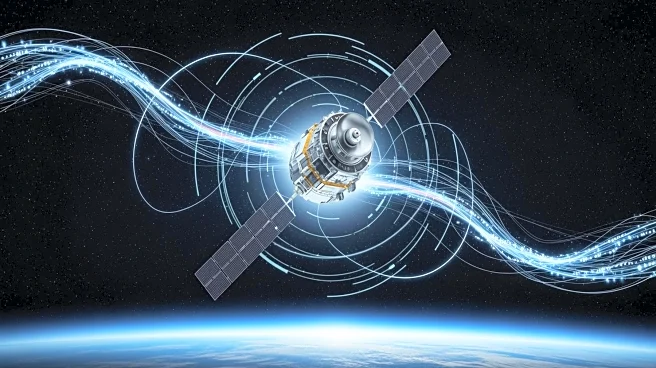What's Happening?
A recent study conducted by researchers from the University of California, San Diego and the University of Maryland has uncovered significant vulnerabilities in satellite data transmissions. The study found that communications from cellphone carriers,
retailers, banks, and even military operations are being broadcast unencrypted through geostationary satellites. The researchers scanned 39 satellites over three years and discovered that approximately half of the signals were transmitting unencrypted data. This exposed sensitive information such as phone calls, military logistics, and retail inventory. The study highlights a mismatch between customer expectations of data security and the actual security practices in place. The researchers used a simple setup costing around $750 to collect a wide range of communication data, including phone calls, texts, and in-flight Wi-Fi data. They also obtained communications from U.S. and Mexican military and law enforcement, as well as ATM transactions and corporate communications.
Why It's Important?
The findings of this study have significant implications for data security across various sectors, including telecommunications, retail, and military operations. The exposure of unencrypted data poses a risk to privacy and security, potentially leading to unauthorized access to sensitive information. This vulnerability could impact consumer trust in telecom providers and other affected organizations. The study underscores the need for improved encryption practices to protect data transmitted via satellites. Organizations may face increased pressure to enhance their security measures to prevent data breaches and protect customer information. The revelation also highlights the importance of collaboration between security researchers and industry stakeholders to address vulnerabilities and reinforce data protection strategies.
What's Next?
Following the study, affected organizations have been notified about the security flaws, and several have already implemented fixes. T-Mobile, for instance, addressed a technical misconfiguration affecting satellite backhaul in remote areas and deployed nationwide encryption for signaling traffic. The researchers have verified that fixes have been implemented for T-Mobile and Walmart. The study may prompt other organizations to review their data security practices and consider adopting stronger encryption measures. Additionally, the findings could lead to increased regulatory scrutiny and potential policy changes to ensure better protection of satellite communications.
Beyond the Headlines
The study raises ethical and legal questions about data security and privacy in satellite communications. The ease with which researchers were able to access unencrypted data suggests a need for stricter security protocols and industry standards. The economic incentives that discourage encryption, such as cost and efficiency concerns, may need to be reevaluated in light of the potential risks. The findings could also influence long-term shifts in how organizations approach data security, prioritizing encryption and collaboration with security experts to safeguard sensitive information.

















